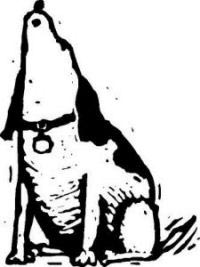Superstitions about Dogs by Jane Francesca Wilde 1888
Join my Facebook Group
See also The Number 13 & Other Superstitions - 100 Books on DVDROM
THERE are no traces in Irish legend of animal worship, but many concerning the influence of animals upon human life, and of their interference with human affairs.
The peasants believe that the domestic animals know all about us, especially the dog and the cat. They listen to everything that is said; they watch the expression of the face, and can even read the thoughts. The Irish say it is not safe to ask a question of a dog, for he may answer, and should he do so the questioner will surely die.
The position of the animal race in the life scheme is certainly full of mystery. Gifted with extraordinary intelligence, yet with dumb souls vainly struggling for utterance, they seem like prisoned spirits in bondage, suffering the punishment, perhaps, for sin in some former human life, and now waiting the completion of the cycle of expiation that will advance them again to the human state.
The three most ancient words in the Irish language are, it is said, Tor, a tower; Cu, a hound, and Bo, a cow. The latter word is the same as is found in the Greek Bosphorus, and in the nomenclature of many places throughout Europe.
SOME very weird superstitions exist in Ireland concerning the howlings of dogs. If a dog is heard to howl near the house of a sick person, all hope of his recovery is given up, and the patient himself sinks into despair, knowing that his doom is sealed. But the Irish are not alone in holding this superstition. The Egyptians, Hebrews, Greeks, and Romans all looked on the howling of the dog as ominous. The very word howling may be traced in the Latin ululu, the Greek holuluzo, the Hebrew hululue, and the Irish ulluloo. In Ireland the cry raised at the funeral ceremony was
called the Caoin, or keen, probably from kyon (Greek), a dog. And this doleful lamentation was also common to other nations of antiquity. The Hebrews, Greeks, and Romans had their hired mourners, who, with dishevelled hair and mournful cadenced hymns, led on the melancholy parade of death. Thus the Trojan women keened over Hector, the chorus being led by the beautiful Helen herself.
The howling of the dog was considered by these nations as the first note of the funeral dirge and the signal that the coming of death was near.
But the origin of the superstition may be traced back to Egypt, where dogs and dog-faced gods were objects of worship; probably because Sirius, the Dog-star, appeared precisely before the rising of the Nile, and thereby gave the people a mystic and supernatural warning to prepare for the overflow.
The Romans held that the howling of dogs was a fatal presage of evil, and it is noted amongst the direful omens that preceded the death of Caesar. Horace also says that Canidia by her spells and sorceries could bring ghosts of dogs from hell; and Virgil makes the dog to howl at the approach of Hecate.
It is remarkable that when dogs see spirits (and they are keenly sensitive to spirit influence) they never bark, but only howl. The Rabbis say that “when the Angel of Death enters a city the dogs do howl. but when Elias appears then the dogs rejoice and are merry.” And Rabbi Jehuda the Just states, that once upon a time when the Angel of Death entered a house the dog howled and fled; but being presently brought back he lay down in fear and trembling, and so died.
This strange superstition concerning the howling of dogs, when, as is supposed, they are conscious of the approach of the Spirit of Death, and see him though he is shrouded and invisible to human eyes, may be found pervading the legends of all nations from the earliest period down to the present time; for it still exists in full force amongst all classes, the educated, as well as the unlettered peasantry; and to this day the howling of a dog where a sick person is lying is regarded in Ireland in all grades of society with pale dismay as a certain sign of approaching death.
The Irish may have obtained the superstition through Egypt, Phoenicia, or Greece, for it is the opinion of some erudite writers that the Irish wolf-dog (Canis gracius Hibernicus) was descended from the dogs of Greece.
It is strange and noteworthy that although the dog is so faithful to man, yet it is never mentioned in the Bible without an expression of contempt; and Moses in his code of laws makes the dog an unclean animal, probably to deter the Israelites from the Egyptian worship of this animal. It was the lowest term of offence—“Is thy servant a dog?” False teachers, persecutors, Gentiles, unholy men, and others sunk in sin and vileness were called dogs; while at the same time the strange prophetic power of these animals was universally acknowledged and recognized.
The Romans sacrificed a dog at the Lupercalia in February. And to meet a dog with her whelps was considered in the highest degree unlucky. Of all living creatures the name of “dog” applied to any one expressed the lowest form of insult, contempt, an reproach. Yet, of all animals, the dog has the noblest qualities, the highest intelligence, and the most enduring affection for man.
For a list of all of my disks, with links click here
Dedicated to my best friend: Teddy Schmitz. I miss you buddy.



No comments:
Post a Comment